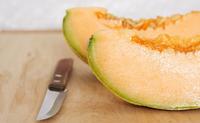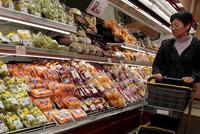-
Food safety grant to fund research on preventing food-borne illnesses

A $1.3 million grant to develop a new food-safety training program for government and industry has been awarded by the U.S. Food and Drug Administration (FDA) to the University of California, Davis, School of Veterinary Medicine
-
-
New Zealand relaxes passenger X-ray screening requirement
To save money and speed up the processing of international passengers, New Zealand no longer requires 100 percent screening of bags of passengers entering the country; Kiwi farmers are worried about the move carry the risk of introducing animal disease into the country; the 100 percent screening mandate was imposed after a foot and mouth outbreak in 2001
-
-
U.S. inspects only 2 percent of all imported food
Each year one in six Americans — 48 million people — gets sick, 128,000 are hospitalized, and 3,000 die from foodborne diseases; the FDA uses a risk-based system to isolate foods with high risk of contamination, but physically inspects only about 2 percent of all imported food
-
-
Contaminated cantaloupe outbreak deadliest in decade

The recent listeria outbreak that has sickened seventy-two people and killed as many as sixteen, is shaping up to be the deadliest U.S. food-borne disease outbreak in more than a decade
-
-
Study finds traces Japanese radiation in U.S. rain and food
A recently published government study found that following the nuclear accident at the Fukushima Daiichi power plant in Japan, elevated levels of radiation were detected in U.S. rain water as well as vegetables and milk
-
-
FDA unveils new outbreak response network

Last week, the U.S. Food and Drug Administration unveiled its new streamlined approach for responding to foodborne illness outbreaks; under the “CORE” Network, the FDA Coordinated Outbreak Response and Evaluation Network, the FDA will bring together multidisciplinary teams consisting of epidemiologists, veterinarians, microbiologists, environmental health specialists, emergency coordinators, and risk communications specialists
-
-
Simple solution for removing arsenic from water

Almost 100 million people in developing countries are exposed to dangerously high levels of arsenic in their drinking water, unable to afford complex purification technology; scientists developed a simple, inexpensive method for removing arsenic based on chopped up pieces of ordinary plastic beverage bottles coated with a nutrient found in many foods and dietary supplements
-
-
Coriander oil tackles food poisoning and drug-resistant infections
Coriander oil has been shown to be toxic to a broad range of harmful bacteria; its use in foods and in clinical agents could prevent food-borne illnesses and even treat antibiotic-resistant infections, according to the authors of a study published in the Journal of Medical Microbiology
-
-
Cleaning water while generating energy
A fuel cell system that can generate electricity from organic compounds and clean up wastewater at the same time has been developed by scientists in China; the cell uses light energy to degrade organic compounds in wastewater, generating electrons that pass through to the cathode, which converts the chemical energy into electrical energy
-
-
Radiation fears cripple Japanese food exports

Japanese agricultural exports have yet to recover from the 11 March earthquake and tsunami due largely to fears of radioactive contamination; to combat these fears, local governments have done all they can to assure consumers that their products are safe; consumers remain wary despite these reassurances, and as a result the Japanese agricultural sector is struggling
-
-
A natural food preservative kills food-borne bacteria
Salmonella and E. coli account for more than half of all food recalls in the United States; salmonella contributes to an estimated 28 percent of more than 3,000 U.S. deaths related to foodborne illness each year; researchers have discovered and received a patent for a naturally occurring lantibiotic — a peptide produced by a harmless bacteria — that could be added to food to kill harmful bacteria like salmonella, E. coli, and listeria
-
-
Melting ice sheets release toxic pollutants outlawed in 2001
The melting of arctic ice sheets causes the rise in sea levels — but there is another danger: the melting causes dangerous chemicals, including the notoriously toxic DDT, to be freed from Arctic sea ice and snow; the chemical — known as “persistent organic pollutants” (POPs) — were widely used as insecticides and pesticides before being outlawed in 2001; they are extremely tough molecules that take decades to break down in nature; they also bio-accumulate, meaning that as they pass up the food chain, concentrations rise, posing a fertility threat to higher species
-
-
New way to attack Salmonella bacteria found
Nitric oxide is naturally produced in the nose and the gut and other tissues in the body to ward off infection; new research underscores that nitric oxide’s antimicrobial actions are due to its interference with the metabolism, or energy production, of pathogens —p and that these antimicrobial characteristics may be harnessed to inhibit the growth of Salmonella
-
-
Japan halts shipments of radioactive beef
The Japanese government is coming under fire for only halting shipments of contaminated cattle now, four months after the 11 March earthquake and tsunami that led to the nuclear crisis at the Fukushima Daiichi atomic energy station; authorities recently discovered that 637 cattle had been fed hay contaminated with radioactive cesium and then shipped from farms in northern prefectures including Fukushima
-
-
Microalgae : Texas' next big cash crop
There are an estimated 200,000 to 800,000 species of microalgae — microscopic algae that thrive in freshwater and marine systems; scientists say microalgae offers a huge, untapped source of fuel, food, feed, pharmaceuticals, and even pollution-busters; it is set to be Texas’ next big cash crop
-
- All
- Regional
- Water
- Biometrics
- Borders/Immig
- Business
- Cybersecurity
- Detection
- Disasters
- Government
- Infrastructure
- International
- Public health
- Public Safety
- Communication interoperabillity
- Emergency services
- Emergency medical services
- Fire
- First response
- IEDs
- Law Enforcement
- Law Enforcement Technology
- Military technology
- Nonlethal weapons
- Nuclear weapons
- Personal protection equipment
- Police
- Notification /alert systems
- Situational awareness
- Weapons systems
- Sci-Tech
- Sector Reports
- Surveillance
- Transportation
Advertising & Marketing: advertise@newswirepubs.com
Editorial: editor@newswirepubs.com
General: info@newswirepubs.com
2010-2011 © News Wire Publications, LLC News Wire Publications, LLC
220 Old Country Road | Suite 200 | Mineola | New York | 11501
Permissions and Policies
Editorial: editor@newswirepubs.com
General: info@newswirepubs.com
2010-2011 © News Wire Publications, LLC News Wire Publications, LLC
220 Old Country Road | Suite 200 | Mineola | New York | 11501
Permissions and Policies
